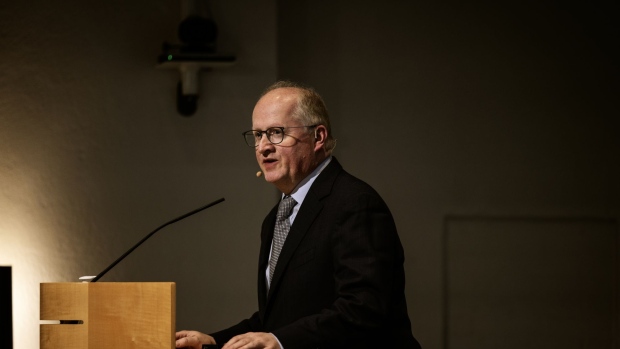Dec 6, 2022
ECB’s Lane Confident Inflation Near Peak as More Hikes to Come
, Bloomberg News

(Bloomberg) -- European Central Bank Chief Economist Philip Lane said consumer-price growth is probably near its zenith, while acknowledging that borrowing costs will be raised again.
“It’s probably too early to make that judgment” whether inflation is cresting, “but I would be reasonably confident in saying that it is likely we are close to peak inflation,” Lane told Milano Finanza newspaper in a interview published Tuesday. “But whether this already is the peak or whether it will arrive at the start of 2023, is still uncertain.”
A week and a half before the ECB next sets interest rates, indications from officials are that they may slow their recent pace of hikes. Ireland’s Gabriel Makhlouf said Monday that a half-point move -- after back-to-back increases of 75 basis points -- is the most likely outcome. Talk of moderation follows the first slowdown in euro-zone inflation in 1 1/2 years.
“We do expect that more rate increases will be necessary, but a lot has been done already,” Lane said, according to a transcript on the ECB website. “The starting point is different now. We’ve already hiked rates by 200 basis points,” he said. “We should take into account the scale of what we have already done.”
What Bloomberg Economics Says...
“We expect the ECB to hike through winter, taking the deposit rate to 2.75% in March. Falling headline and core inflation should mean the Governing Council cuts rates toward the end of 2023.”
--Jamie Rush, chief European economist. For full Insight, click here
On consumer prices, the ECB chief economist said that he couldn’t “rule out some extra inflation early next year. Once we are past the initial months of 2023, later on in 2023 -- in the spring or summer -- we should see a sizeable drop in the inflation rate. That said, the journey of inflation from the current very high levels back to 2% will take time.”
The ECB will probably have to go into restrictive territory on rates next year, said Alfred Kammer, who heads the European department at the International Monetary Fund.
“Inflation has been more persistent than expected, it’s higher than expected, so more action by central banks is required,” Kammer told Bloomberg Television’s Francine Lacqua and Tom Mackenzie on Tuesday.
Asked whether the inflation rate might drop to 6%-7% in 2023, Lane said that “the initial downshift from the current high rates will be to around that level” with a further reduction to follow.
Still, “we do think there will be a second round of inflation,” Lane said, citing bigger-than-usual pay increases over the next three years. “That is why it will take some time to return to our 2% target. So the second round effects will drive inflation next year and in 2024.”
(Updates with IMF comment on ECB starting in sixth paragraph.)
©2022 Bloomberg L.P.






